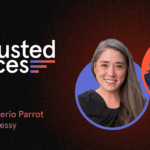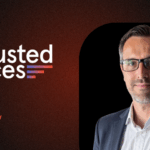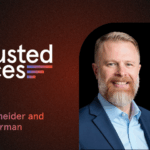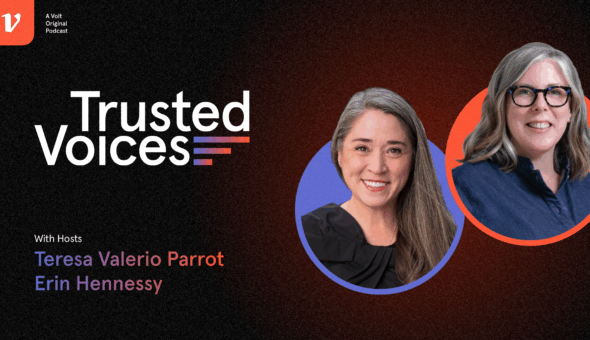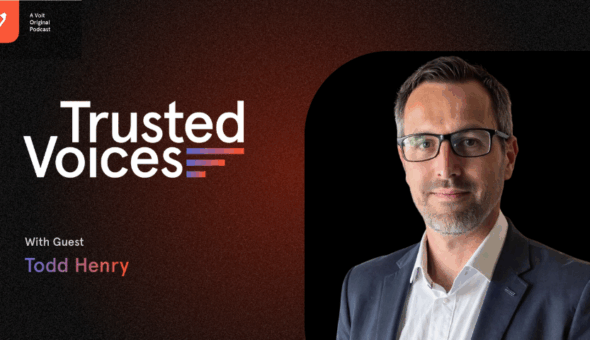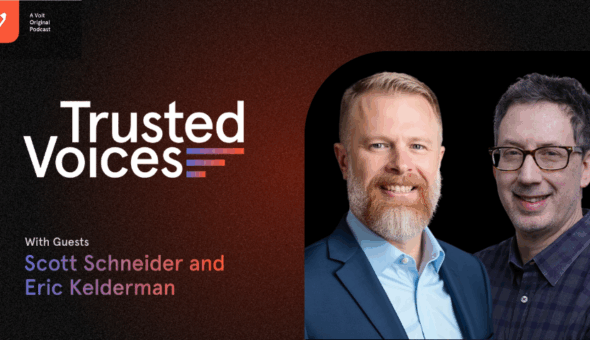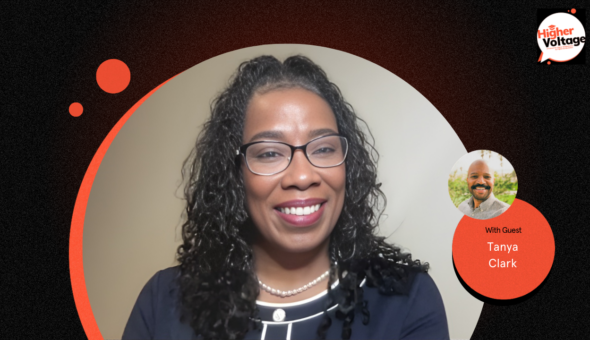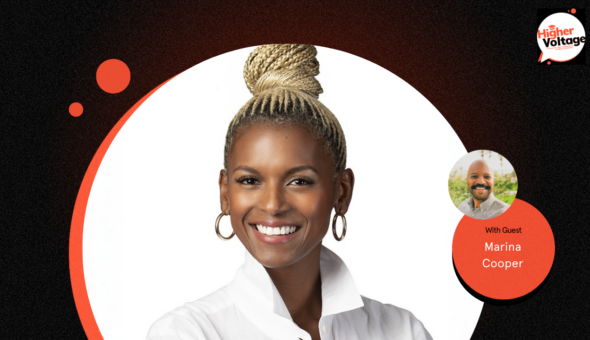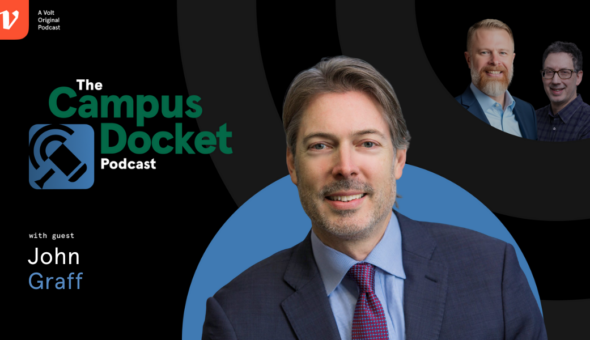In late January, Florida’s Department of Education rejected an AP course on African American Studies for violating its recently enacted laws constricting how topics of race and gender and sexual preference can be taught. Days later, the College Board announced revised changes to that curriculum, a move that critics say were made to appease Florida governor Ron DeSantis.
This is just one recent example of higher ed in the crosshairs in Florida, and the increasing politicization of both K-12 and higher education across the country shows no signs of slowing. And so, today, we have a very special crossover episode of Volt podcasts Higher Voltage and Trusted Voices, with hosts Kevin Tyler, Teresa Valerio Parrot, and Erin Hennessy, to discuss the implications of all of this.
Reference readings:
- https://www.npr.org/2023/02/01/1153434464/college-boards-revised-ap-african-american-studies-course-draws-new-criticism
- https://www.npr.org/2023/01/22/1150259944/florida-rejects-ap-class-african-american-studies
- https://www.city-journal.org/florida-state-university-adopts-dei-programming
- https://twitter.com/JonBoeckenstedt/status/1620939697123123200
- https://twitter.com/JuddLegum/status/1621141343429922816
- https://www.chronicle.com/article/what-is-happening-in-florida?cid2=gen_login_refresh&cid=gen_sign_in
- https://www.wsj.com/articles/ron-desantis-seeks-to-defund-diversity-programs-in-floridas-higher-education-11675198558
- https://www.insidehighered.com/news/2023/02/03/outrage-follows-florida-college-presidents-statement-crt
- https://www.thedailybeast.com/ron-desantis-and-the-new-campus-free-speech-crisis
- https://www.chronicle.com/article/could-north-idaho-college-really-lose-its-accreditation
Read the full transcript:
Erin Hennessy:
Hello and welcome to the very first crossover episode of Higher Voltage and the Trusted Voices Podcast. I’m Erin Hennessy, alongside Teresa Valerio Parrot, and the host of Higher Voltage, Kevin Tyler. We’re together today because there are a number of news items coming out of the State of Florida that we felt really warranted a larger discussion than either one of our platforms could accommodate. And so what we are going to attempt to do today is talk a little bit about Florida’s Department of Education’s rejection of an AP course on African-American studies, but we’re also going to go a little bit broader and talk about what’s been happening lately in higher education in Florida and ways in which higher education in that state seems to be being used as a tool for political ends.
So I’m going to open this conversation up to my good friends, Teresa and Kevin, and thank them both for joining me today and thanks to the Volt team for jumping on to enable this very quick last-minute podcast about such an important issue.
Kevin Tyler:
Thanks so much, Erin. I’m pleased to join TVP once again for another incredible conversation about current events in higher education. I’ve been thinking quite a bit about what’s going on in Florida and thinking about when and how it’s going to seep into the rest of the nation because this is not language that is only relegated to the state borders of Florida.
We see this kind of language popping up in state houses across the country, and it’s going to start to take a toll on the way that higher education is not just perceived but trusted and the awareness of what’s going on politically is going to have an impact on the work that we do at the agency I work in at Simpson Scarborough, and I’m sure the work that you all do at TVP as well. I’m excited for this conversation
Teresa Valerio Parrot:
And I think one of the things that I want to stress is, first of all, I’m excited to be talking to Kevin again. I think Erin and I always appreciate those conversations, but second of all, I just want to go back to the framing of this and that’s that I think higher education has always been, will always be, a political issue, and I think that we’re seeing it being used yet again as a tool for that conversation.
I think that’s a framing that’s important, and I really look forward to digging into this because, Kevin, to your point, we’re not just talking about the image and reputation. We now are talking about what is being taught, what can be discussed and how it is that we are thinking about ourselves as free speech zones in ways that both the left and the right are using that framing for their own purposes.
So this is where I advocate a bit about how useful it has been for me to get a doctoral degree. Not there yet, everybody, a couple of months, but what I am studying is higher education. So some of what I’ve experienced is working for a publicly elected board. I reported directly to that board. Being a consultant, I’ve reported to boards that are appointed. I’ve worked for boards that are elected, and we see how that trickles up also to the state level and how states do or don’t participate in, for example, approval of curriculum and new programs.
Each state is different. Sometimes it’s the constitution of the state, sometimes it’s bylaws, et cetera, in choosing how they populate boards. So I think this is really a fantastic moment, and I’ve had this throughout my doctoral experience to say, “Do your homework in your own backyard and figure out what that system looks like for your public institutions, what the processes are for your state boards, whether it’s for PK12 education or higher education, or perhaps a joint board.”
This really is a moment where I want us to go ahead and have a positive conclusion to what it is that we’re talking about is, and that is that each of us has an obligation and an opportunity to better understand how higher education operates in our states and also how we can participate in how it operates, moving forward.
Erin Hennessy:
Amen. As a former local school board member, I second and third all of that. Kevin?
Kevin Tyler:
One of the things that I have to remind myself of often, almost all the time, is that when I have conversations about diversity, equity, and inclusion, like the things that we’re talking about today and the things that are happening across the country, it’s important for me to remember that that includes people who have other viewpoints different than mine. And so just like I will never spend my money at Chick-fil-A, there are lots of people who will and they feel like that and that is an important part of their day, and I have to make room in my brain to remember that because the way that I view the world is not the only way to view the world.
I do however think that places like higher ed or having conversations that sounds like anyone who seeks it should be able to access it, when we talk about things like we want to increase diversity on our campus, all of these conversations that I have at work, if we’re having those conversations and you’re telling me that your mission is about serving all or serving your state or whatever it is, then we have to help hold you accountable to that.
And if the conversations we’re having are about excluding other people who don’t live up to or match what you think is a good American or whatever it is, I take issue with that and I might come off as a biased person here, but that might be because I am. I think that my existence isn’t a crime. Being openly gay and openly Black are things that make me who I am. And so when I see these attempts in these states, I think about all the people who… I was a young Black kid applying to colleges outside of Ohio, and I picked states that I felt were safer for people who looked like me and who loved like me. And so while I am an advocate for all things diverse, all things inclusive, all things equitable, I also need to keep in mind that not everyone lives the same kind of experiences I do. And there might be people out in the world who are like, “This is great stuff. That’s how we’re going on in Florida.”
Teresa Valerio Parrot:
Agreed.
Erin Hennessy:
Yeah. I think what it comes down to for me is when you are using public funds, to your point, Kevin, and you are claiming to serve the residents of a state. You need to use those public funds to serve all residents, not just the ones that align, that go to Chick-fil-A or that don’t. I think this could be a four-hour episode if the three of us really got going, depending on how much caffeine’s in the system.
But I wonder if we start with college board and then we can move on to the other big chunks of this story, which I think revolve around governance issues, revolve around curricular issues, touch on accreditation. But why don’t we start with college board. From what I’ve read, and fact-check me here if necessary, the college board is offering an AP African American history course, which the Department of Education in Florida has determined does not meet its educational standards and has pushed back in response.
The college board knocked large chunks of that curriculum out, including the intersection of African American history and feminism, including the intersection of African American history and queer history. And those seem to be large chunks of what Florida is opposed to, although that’s what’s been reported. Who knows what else is happening currently on the ground. Do either of you want to jump in on just sort of the college board issue itself and how the board, which doesn’t have the greatest reputation at times, is responding to this and how that is perceived by folks who are working in the field?
Teresa Valerio Parrot:
Yeah, I’m a little bit concerned about, I’ll just say, the appearance of impropriety. I’ll keep it in that range. And that is that the State of Florida uses the SAT as a marker for their high school students to look at what they’ve learned and what their career trajectory might be. And I think there is this appearance of impropriety that a state that has the ability to cancel that contract on using that test and then make requests of and have significant changes made to curriculum. I think that’s one of the questions that I would have.
And I’m intrigued by the fact that a state can choose to take out real elements of history in a history course. I just think that that’s fascinating because, if that’s the case, then I think we have 49 other states that might be saying, “What else do we want to influence within the curriculum that is in AP courses or other types of material that and testing and resources that we buy?” It’s a very dangerous spot, I think, for us as a country.
Kevin Tyler:
I can’t agree with you more, Teresa. I think the impression of impropriety is a great way to state that, or appearance of impropriety. I think when you look at the way that the college board makes money and we look at the number of schools that are not requiring the SAT anymore and how that is increasing, where are they going to get that other money from? And a lot of that money comes from AP courses.
$500 million of their revenue comes from AP courses. They are incentivized to adjust their approach to things based on how leaders in the states that they operate in want them to approach things. Because if the governors don’t like it in states like Florida and South Dakota and Iowa, all these other states that are passing these laws, then they will not use the product that college board is offering and they lose a lot of money from that.
And I think this is one of those places where we see the pressure of politics really inflict tension on something that should not be political. I know that there’s a political history of higher education. I understand where politics weaves itself into the higher ed space. However, this is a much different threshold that we have crossed, to have state government say, “We are not going to allow these things to be taught.”
The first question I have is what happens to the kids who are applying to schools outside of the State of Florida or these other states and how do you assess the quality of their preparation? How do you know that they’re going to be ready to engage with other students on your campus? All these questions I think about, and it all comes back to the money that college board makes. To me, it’s a very interesting time right now in higher ed.
Teresa Valerio Parrot:
I would go back and say that I think that we have an example of this, Kevin, of what this looks like and how this then becomes adopted in greater ways. I just did a quick Google search about Texas and how they have edited and adjusted their history textbooks over the years. And this has happened in 2010, 2014, 2016, 2018, 2019, 2020, 2021, and it will continue to happen. And I think the editing of history makes me nervous, but I think that’s a book and that can always be supplemented.
I think what feels different to me about the AP curriculum is that we’re talking about curriculum. This is what is going to be tested. This is what is framing and shaping in different ways than just a textbook. And I feel like there is this step and there is this discussion in the State of Florida to start moving towards a Western civilization-based core curriculum. So the talk about curriculum then is jumping into how we’re talking about this in higher education and what is being decided is valuable history and what isn’t, and we’re erasing what isn’t apparently valued.
Kevin Tyler:
And the thing that I think we need to pay particular attention to are the points that are being raised by people like Adam Kissel, I think that’s his name, from the Heritage Foundation, who is like, “Now that we see these arguments being challenged in courts, here is another approach to shield these efforts from any sort of litigation, any sort of lawsuit.”
And that is why I’m so concerned about the national reach of some of these conversations because we have coaching going on out in public, out in the open, around, “Listen, don’t go up against just the individuals teaching the things, go against the administrators and what they are hoping to add to the curriculum.” And that is a much different conversation, which is just to piggyback on your point, Teresa, I think that is a fantastic point to make.
Erin Hennessy:
Yeah, I think for so long we have talked about the states as the laboratories of democracy and what we are seeing is sort of a perversion and a bastardization of that. As we have seen conversations about book banning sweep across the country, as we have seen conversations about what the appropriate role of parents is in curriculum and selection of materials, in all of these sort of things, it is not a coincidence that these things are hopscotching across the country.
It is a concerted campaign. It is a concerted drive. It’s helped by a range of organizations including ALEC, A-L-E-C. I forget what it stands for, but it’s basically a think tank that creates model legislation that can be shared across the country, that advances Conservative causes in a number of states. And so what we are seeing in Florida, I think, Teresa, to your point, is this laboratory of democracy.
And once it happens, I think there will be any number of attempts by other red-leaning states like Texas and others that we’ve mentioned, we’re going to see efforts to replicate this approach. It is interesting to me that no one is standing up and saying, “We don’t want you to teach AP African American history. What we’re going to do is pick this apart and pick what are perceived as the most woke parts of this curriculum, around queer history and around Black feminism. And we’re going to start pulling there first.” And I wonder if other states are going to take a more aggressive approach where they say, “We’re not going to offer this in its entirety,” rather than starting to pull at threads that could eventually unravel this curricular offering within the state.
Kevin Tyler:
I think the approach to this that has happened in Florida has been so systematic and so strategic and so calculated. None of this would’ve been able to work had we not had the other decisions or all of the other points that DeSantis has raised during his administration. This has been a consistent chipping away at what equality and inclusion and diversity is supposed to look like anywhere.
It’s fascinating to watch this start and then spread, because the softening of the ground that he has done around these conversations, around wokeness, around Blackness, around intersectionality, you couldn’t have gone from A to Z in a month. It has to be subtle, it has to be gentle, it has to be the frog in the boiling water kind of thing. And at the end of the day, it’s like none of us should be surprised by any of the things happening in a state like Florida because we’ve been told it was going to happen for the last few years.
Teresa Valerio Parrot:
Well, and I think it goes back to the political nature of college campuses. We need to be paying attention to who’s being appointed to boards and whether that is at the state level or at the institution level. We need to be paying attention to who has the ability to sign off on curriculum and offerings and some other elements tied to all of this.
And I would say I’m going to bring in another state again, I think if you look to one of the first actions that new governor Huckabee Sanders created, we no longer have the term Latinx that is being used in Arkansas State documents. And Pew Research says that only 3% of Hispanics or Latinx people use that term. I’m not one of them, but I also don’t want someone to tell me how I can describe myself, how I can describe my family.
I feel like that’s a very personal decision. And I understand that this is within state documents, but it starts with state documents. It starts as, Kevin, you were saying, in some of the language changes, it starts with who gets appointed to what board and in what position. And it’s all of the pieces together that really get to this critical point where we stop and say, “How did we get here?”
Kevin Tyler:
We have states like South Dakota, we had an episode not too long ago with one of the former faculty members from the University of South Dakota, Dyanis Conrad, who was, for lack of a better term, targeted by the governor because of CRT, et cetera. And the governor of South Dakota has removed the word diversity from all campuses in the system.
And so we see this attempt to erase the true history of America. And let’s be clear here that the history that all of us have likely learned comes from a more Western colonialized perspective. The people who win things typically write the history of what happened. And we see a further effort to do this into the future, which I think we all are surprised by, unfortunately.
Erin Hennessy:
I wonder if this is the moment to shift our conversation a little more directly to higher ed and talk about some of the things that Governor DeSantis has done around higher ed specifically. But I also want to make sure that we pull in a question that I just think it’s loomed over us for the entirety of the COVID struggle, which is this sort of societal urge to set aside people who are experts within a field and allow those who aren’t, those who are politicians, those who are elected, but don’t come in with a real expertise, either from study or from practitioning, and what it is about society today that makes people distrust experts, distrust credentials, distrust.
It sort of goes to the core question, distrust higher education entirely, when we have people wanting to put Dr. Fauci in jail. I think we’ve sort of lost the thread on how we rebuild trust in expertise. And that’s certainly relevant to the work that Teresa and I and our team do every day, trying to make experts and their expertise more relatable and more directly impactful for lay audiences.
And so I think that’s sort of the question that looms over all of this as we talk about what’s been going on in higher education proper in Florida around board seats, around requirements that presidents not fund certain programs and certain supports for students. So do we want to launch into that part of the conversation?
Teresa Valerio Parrot:
I think it’s a pretty easy answer, and I think we’ve answered it in pieces, but to your point, we can pull it together. And that is, I think that this is really about what makes people uncomfortable and really makes them question privilege. And sometimes that privilege questioning makes them feel that much more uncomfortable. So it is a self-perpetuating cycle. And the reason that I say that is that, if you think about what’s being taken out of the curriculum specifically for that AP course, I promise we’ll get to higher education, but if you look at what’s being taken out, it’s the intersectionality, right? It’s feminism. So looking at those who have pushed back on systems. It is the LGBTQ and Black intersectionality, and they have pushed back against some privilege and against some ways in which we have done business in the country.
So I feel as if the reason that we see these folds in the way that they are is because, if you take out the history of those who have pushed back, if you take out the ways in which they have framed their questions and what it is that they say that they want America to look like and represent, then you start to create more comfort for those who feel as if their boundaries have been pushed.
Kevin Tyler:
Yeah, I think that we have seen a history, especially in political activities around using the LGBTQIA+ community as a lightning rod to gin up or fire up an audience. We saw it in 2004 with the presidential races, with gay marriage on the ballot and all of the states, all the things that the people were saying around that. We see it again in a much more aggressive fashion. Now, all of the legislation coming out against trans kids now. We see Donald Trump saying that he wants to ban trans people altogether from America, whatever it was.
We see these attempts repeatedly throughout history around we know this topic gets people fired up because of the history of America as a religiously-based institution, idea of Americanism. All of those things are challenged when new people come into the fold. And we are at a time when the American demographic is changing rapidly. And I’m a firm believer that when people who are in power start to feel like they’re losing power, they will stop at nothing to keep it. And so we’re going to see these efforts become more egregious and more aggressive over time because the country is changing, and I don’t want to see what that’s going to look like, quite frankly.
Teresa Valerio Parrot:
And Kevin, to that point, I feel like the threshold for what is clickbait now continues to rise. So we’ll continue to see these claims and the statements and the decisions from governors, et cetera, grow in what it is that they’re proposing because they need to get to the new level of what is considered alarming. They need to get to whatever it is that’s going to drive the clicks and, as importantly for them, drive the donations, whether it’s to their campaigns or to their causes.
Kevin Tyler:
Right. And I think that one of the things around college in higher ed in Florida is that an institution is sometimes the largest employer in a place. And if you start to destroy what is going on in your state, from an employment perspective, the consequences of decisions like this can be quite far-reaching. We have an aging population in Florida. We have institutions that are huge, employing loads and loads of people. Is this worth all of that? And that’s just what I always kind of come back to.
Erin Hennessy:
So can we flip that question on its head and talk a little bit about what the actual impacts we’re going to expect to see of all of this sort of political machination around education and higher education in Florida? What could this mean for the student in, pick a state, Maryland, New Hampshire, Iowa, who is thinking about looking at institutions in Florida, public institutions in Florida, and considering whether or not it’s a place they want to pursue their education, whether that student is white, Hispanic, Black, Asian, whatever it is, what kind of conversations do we think students and their families are having about whether or not Florida is now a suitable destination for their educational journey?
Teresa Valerio Parrot:
We had a version of this question the first time that we were on Higher Voltage and we were talking about Texas and some of the legislation that was passing through that state tied to reproductive rights. And I said at that time, and I hold now, I don’t know that it’s going to have the impact that so many people think it will have because especially these are public institutions, in theory, they’re there first and foremost to serve the students of the state, and people usually go within a certain number of miles from where they live.
And if that’s the case, then we see similar approaches to higher education in contiguous states to Florida. So I don’t know that we’ll have that impact that we continue to talk about. And Florida has a number of the largest public institutions in the country. I know for example, Miami Dade, over the course of a year, has 100,000 students online and in person. That’s a lot of students. They have the numbers that suggest that they can go ahead and have these kind of shifts and people will still come.
Kevin Tyler:
And I think what we know about Gen Z is that they’re more likely to stay close to home for their college education, but also those audiences that are more marginalized, say African American folks, GLBTQIA folks, they’re going to look at safety more often than location because of the things that are happening in the news all the time.
And so I think about people looking at schools in Iowa, Florida or South Dakota, who now might be reconsidering their decision, and to have to either look at other schools or put off higher ed altogether, which is the other option. And so I’m not sure what’s going to happen for those students who are looking for a safe environment where they can count on getting the kind of advocacy and support they need for their educational experience.
Erin Hennessy:
And I think it’s important to note that so many of the students within those marginalized populations are the ones for whom economics rules over everything in terms of affordability, in terms of being able to still work, in terms of being able to continue as a caretaker in whatever their family position is. And so those options for those students in Florida who may feel unsafe on some of these campuses, I think you’re right, Kevin, we may see far more students postpone or just turn away from higher education entirely instead of putting themselves in a position at an institution in Florida where they are going to feel targeted by the policies that the state is handing down and that the institution is agreeing to abide by.
Teresa Valerio Parrot:
I actually think we’re going to see a shift, based on Gen Z’s preferences, period. And I don’t know that they will just turn away. I think they’ll look for other options. I think that online education, they went to high school with Zoom, they went to college with Zoom. And so for them online courses isn’t quite the same distasteful experience that it was for previous generations. And so I think that we might be looking at an “or” and that or is a shift away from in-person and instead going online.
So you still can have that experience, but you aren’t going to be interacting with your peers in a way that you would be if you were in person. And I have to say, I don’t doubt that that’s also a tertiary, maybe a secondary goal of all of these changes. You move those who have additional identities so that they are more invisible to the campus community. I think that unfortunately that may be part of what we see so that students can maintain their own safety.
Kevin Tyler:
Yeah. And I think when it comes to brand, I mean one of the conversations I still think about often, and I think Florida is one of the best examples of this, is can you separate the brand of a state from the brand of an institution? And what we’re seeing in Florida is that the brand of the state is the brand of the institution nowadays, especially when it comes to DEI conversations. And so when it comes to brand, it works for the people who align with what you’re saying, and it also works for the people who don’t align with what you’re saying.
And so there the people who don’t want to have an environment, live in an environment like Florida is creating for students on campuses, there are people in the country who are like, “That is the place for me.” And so when we think about what this might look like in terms of recruitment and enrollment, there possibly could be students across the country who are like, “Man, Florida sounds great nowadays. I want to go to learn there.”
But I just don’t know what that means for the rest of their career. Are they learning the things that they need to learn to work in a corporate setting where there’s going to be lots of different kinds of people there? I don’t know what that means, but I just think it is such a fascinating point in our higher ed history to see this happening at the risk of losing such an incredible and important industry.
Teresa Valerio Parrot:
And I think there is also this potential, you were just describing this, where these universities might become more appealing to students from other states. I’ve read a couple of pieces recently in the higher ed trades that are talking about some of the evangelical universities that are really making sure that they are tailoring their offerings to what it is that they know that potential students might want. And I think that what we’re seeing is this becomes the public university version of that.
So I think there is the potential that we could see some institutions that have some bumps in enrollment, and DeSantis has been very clear and he has received great commendation for keeping higher education affordable in the state. So there is that option for out-of-state students also to reap the benefits of how he has capped tuition increases. And for students that are already on campus, in some ways that low tuition now is golden handcuffs to keep them on campus because they can’t afford to go anywhere else based on how the pricing structure works.
Kevin Tyler:
One of the things I wonder about is if and when institutions in other places will start to leverage some of the NACAC allowances for transfers, and how that might roll out. So if you know that you can now court students who have already enrolled in other places and they live in a state that might not be as friendly as they had maybe hoped in the beginning, will institutions start to say, “We need more people here. Let’s start to get transfers here.” And now that that’s allowed, that might make things look even more different. I’m intrigued about what that could look like.
Erin Hennessy:
Yeah, particularly those states that are real close to Florida where there may be, again, more comfort with staying a little bit closer to home and not striking out for the wilds of New York or wherever it might be. I do want to move us along because, again, there is so much to talk about here, but one of the things that I was interested in, and honestly I keep tumbling this around in my mind. The Florida College System presidents last week signed a pledge, issued a statement that promised “To not fund or support any institutional practice, policy or academic requirement that compels belief in critical race theory or related concepts.”
The Florida college system is predominantly two-year institutions, so these are really the front porch of the higher education system in the State of Florida. There’s some coverage that seems to suggest that what the presidents may have done by very carefully choosing their language within this longer statement is to provide enough cover to keep the governor happy, but also not to restrict their academic enterprise too significantly. I don’t know if I buy it. I want to buy it. I want to believe that argument. And I’m not sure that I do. I don’t know if you all read the full statement and have thoughts on any of this. Do you guys believe that this was strategic language and not just a capitulation to what the governor’s asking for?
Teresa Valerio Parrot:
Because you and I work with words, when I read this, I read it and pulled it apart in exactly the way that they are proposing that they framed it because it says that “they will not fund or support any institutional practice, policy or academic requirement.” And that’s different than saying they won’t teach this. So I think that there is this wordsmithing and there is this language crafting that has happened. I think the difference is will that be enough?
Because I think the governor will say, “And my intent was… And I read this to say,” and I think that’s where we’re going to see that you can be very diligent in how you frame what you’re saying, the words you choose and what your intent is, and that doesn’t mean that that’s how somebody else is going to interpret it. And in this case, especially someone who has the ability to take away funding. So I think they bought themselves some time. I think they bought themselves some goodwill internally. I don’t think that this is over.
Kevin Tyler:
Not at all. I agree totally 100% with what Teresa just said.
Erin Hennessy:
Do you think they’ve bought themselves some criticism from colleagues in higher education across the country for seeming to capitulate?
Teresa Valerio Parrot:
Yeah, I’m just seeing it on social. We’re seeing everybody pick this apart and say it is a step. You have taken a step in this direction. Even if you think you were able to split hairs and to get this statement where you wanted and needed it to be, it is seen as a movement and a weakening of what have been very high walls in higher education that we didn’t want anybody to breach.
Kevin Tyler:
Right. And I mean, all of these things, all these little actions, all these little decisions are all chipping away also at the trust people have in the industry itself. And so as we ruminate and spend all this time about the language that they used in this, those decisions are just making it more confusing about should I even waste the money on an education at all? Because if you can’t figure this out for yourselves and you’re bending to political pressure, whatever else, is my experience, is my degree, is my credential going to be worth as much as it’s supposed to be? And I don’t know the answer to that.
Erin Hennessy:
Agreed. The one thing, one of the last things I want to raise, and obviously there’s room for anything else you all want to bring up that we haven’t covered, but Teresa and I spend so much time counseling presidents and senior leaders on how to respond to demands from the community, from students, from alumni, about reacting to happenings, particularly in the political world, that seemed to be diametrically opposed to the mission of higher education. We should be standing up for this. We should be standing up against that.
And I think the criticism of this kind of statement absolutely is sort of the beginning of the slippery slope. And it’s going to be interesting to see how it continues to ripple and whether or not other states do something similar. But I think there has to be some section, some segment of the industry. And there’s part of me, too, that is wondering who is going to stand up to these kinds of nakedly political aggressive actions in the State of Florida? And I’m having a hard time coming up with who or what organization that might be. And the only thing I keep coming back to is the accreditation process and accreditors in general.
Teresa Valerio Parrot:
Oh, I have thoughts.
Erin Hennessy:
I’m sure you do.
Kevin Tyler:
Same.
Erin Hennessy:
And so, should we expect the accreditors to come charging in to save the day? Should we expect a very carefully worded statement of concern? Should we expect anything at all? Because this does seem to me to be messing directly with curriculum and messing directly with how institutions govern themselves. And you would think that this would light the hair of accreditors on fire across the country. In a switch of our usual roles, Teresa, am I the Pollyanna here? Am I the wild-eyed optimist?
Teresa Valerio Parrot:
Yeah, I think maybe you are.
Kevin Tyler:
I was just going to say, I’m glad you said it first, because I was going to say it, too.
Erin Hennessy:
I don’t think it’s an insult necessarily.
Kevin Tyler:
No.
Teresa Valerio Parrot:
It’s so strange for me to be on the other side and to say, “Okay, here’s the thing.” It takes so long and you issue a letter of warning and you have concerns, and then what do you do about it? I think the issue and worry that I have is accreditors have this power and the timeline for something to happen is significant, and what is the damage that happens in between? That really, really makes me nervous. And I think we need to be thinking about what tools do we have within academia?
Because I’m seeing today that there are protests planned at campuses, and I would bet that for some of these institutions we’re a minute away from some votes of no confidence. And what I would say is that if your boards are aligned with the governor, in part because they’re appointed by the governor, then those protests and those votes of no confidence and the letters from AAUP and all of these ways that we normally clutch our pearls and talk about how concerned we are for the future of the industry, those boards aren’t going to care. And if anything, it is going to prove exactly what they want for their audiences-
Kevin Tyler:
Exactly.
Teresa Valerio Parrot:
… to think and to know. So this is a time, I think, for accreditors to step in, but they need to do so in a timely manner right now, and it needs to be a concerted effort across the accreditors because this isn’t just a Sachs COC issue. This isn’t just, pick an accreditor, this is all of them. Because we’re seeing these chipping away at the foundation of higher education, all of these efforts across the country. It’s not just a Florida thing, it’s not just a Texas thing. It’s in a number of different states.
Kevin Tyler:
Right.
Erin Hennessy:
Yeah.
Kevin Tyler:
And I think-
Erin Hennessy:
And it’s worth pointing out-
Kevin Tyler:
I’m sorry.
Erin Hennessy:
Sorry, Kevin. That North Idaho College is going through something very similar right now, and the accreditor has stepped in and said that the recent and subsequent public actions of the college’s board “appear to place the institution at significant risk of being out of compliance with a number of NWCCU eligibility requirements and standards.” So there is an accreditor that has stepped up around very similar issues. There is a piece from late last week in the Chronicle of folks who are looking for additional details on North Idaho College, and we can share that in the show notes as well. Sorry, Kevin, go ahead.
Kevin Tyler:
No, you’re fine. It’s totally fine. And I think simultaneously, while the point that you just raised, Teresa, is that higher ed has been so steeped in competition for so long that there is really no statewide organization that is functional anywhere. Because we’ve been counting our students against the school down the road, we have not been forced to work together as institutions to say things like, “This is not right.” We don’t have that structure in place. Yes, we have some lobbyists, federal lobbyists, they’re not tons and they’re not doing the type of work that would impact some of the conversations that we’re having here.
But if we are able to lift ourselves out of that competitive landscape and into more of a cause-based or vision-based or purpose-based movement, that might hold some water. But again, you’re right, if the structure is being influenced by politics, by virtue of appointments, then it’s going to be a steep uphill battle to get some of the stuff rectified.
Erin Hennessy:
We are going to share a bunch of links in the show notes of this episode. We really thought this was an important conversation and we really wanted to bring the three of us together to have it.
We are grateful that you are listening and hopefully engaging meaningfully with these issues in your community, at your institution. We look forward to continuing this conversation between the three of us and hope there are opportunities to broaden that out as well. On behalf of Teresa Valerio Parrot and Kevin Tyler, two of my favorite people, and on behalf of the Volt team and DJ Hauschild, we would like to say thank you so much for tuning into this episode, and we will look forward to seeing you in your feeds individually and together again real soon. Thanks so much.
Kevin Tyler:
Great to see y’all.
Teresa Valerio Parrot:
Bye.
